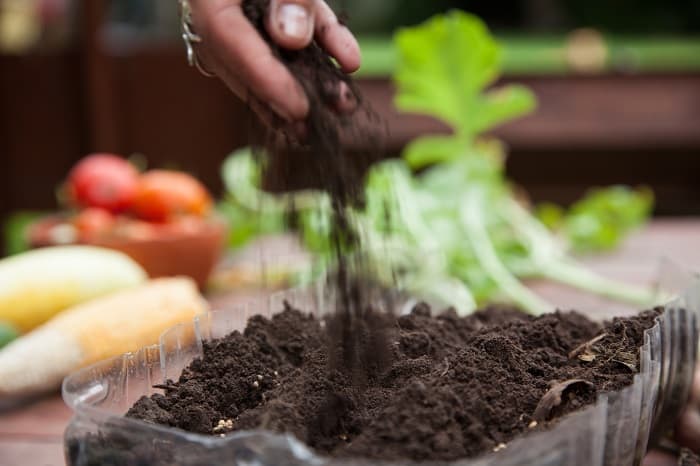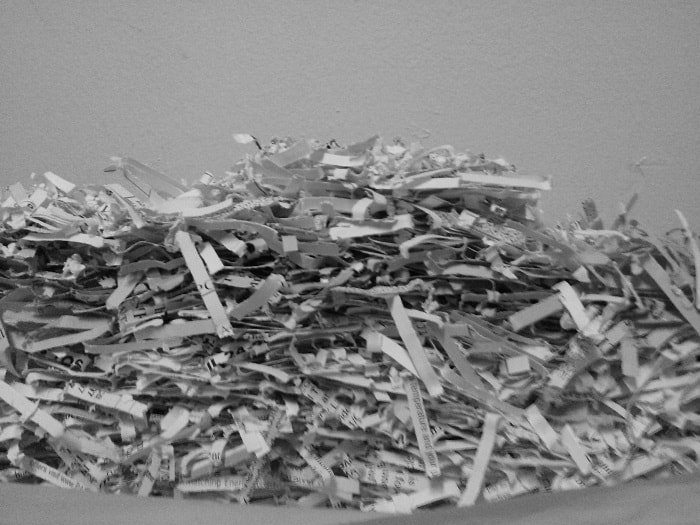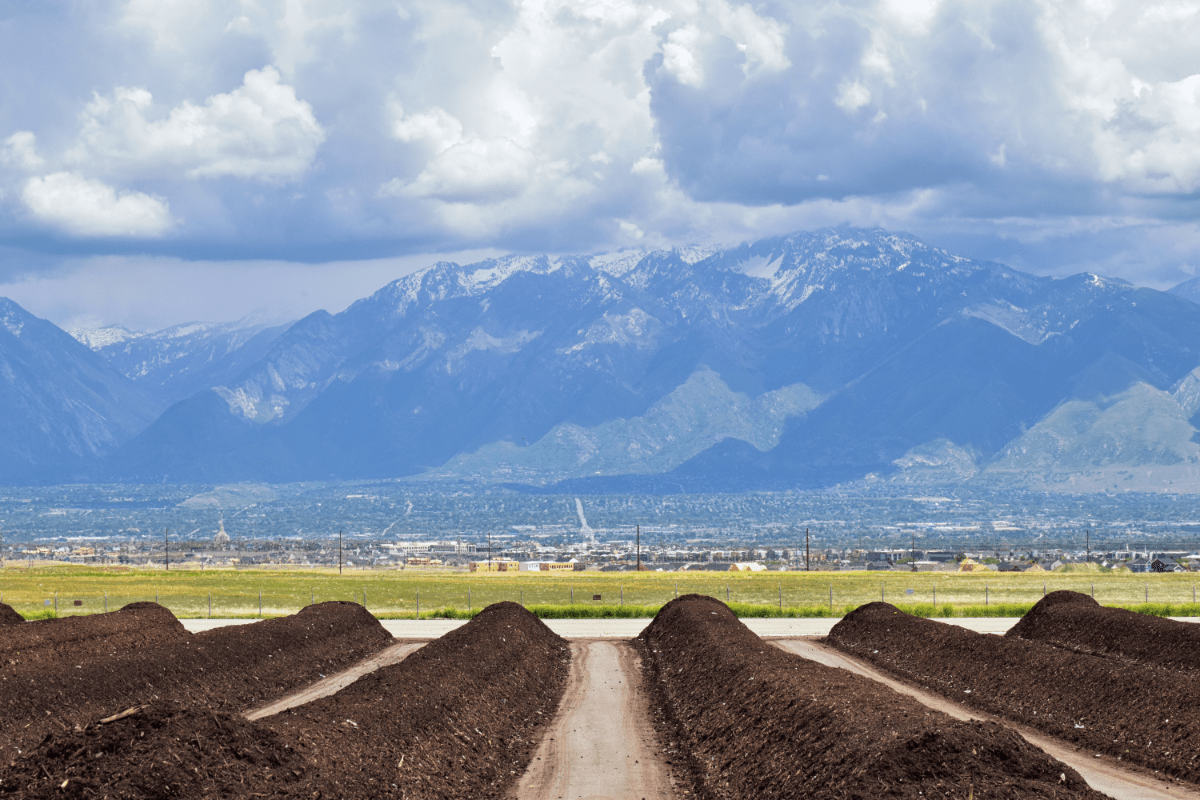If you are starting a compost pile, one of the challenges you will face is knowing when your compost is ready for use. It is not like a fruit that you can tell when it is ripe, but you should know that your compost pile like fruits sure do get ripe.
There is no saying how long it will take for your compost pile to be ready, this is because there are factors that can decide whether your compost will be ready in a few months or years.
Knowing when your compost is ready is important if you intend recycling your kitchen waste for use in your garden.
So how then can you tell when compost is ready?
How to Tell When Compost is Ready
Yes, you heard right, finished compost looks like a dark brown crumbled piece of dirt. You almost cannot ignore the appearance of finished compost. It smells different than it used to during the early stage of decomposition. Instead of the rotting smell of vegetables and the wet bacteria-laden bin you are used to, you begin to notice that the bin smells less offensive, and stays dry.
There is no science to determining when your compost is ready to be used in your garden. You don’t need to perform any laboratory test or make use of any fancy gadget. You can easily tell your compost is ready by merely looking at it.
If you are up for it, and willing to spend some cash, you can perform a home test on your compost to see if it is ready for use. These home tests lookout for many criteria when checking the compost. Some of these criteria include the temperature of the compost, microbial activity, and pH concentration.
You need to ensure that you use only mature compost on your plants. Making use of immature compost can result in complications in your garden. You don’t want anything to affect your yield at the end of the planting season.
Immature compost contains contaminants that can damage your plants. These include pathogens and toxic acids. You can reduce the presence of contaminants in your compost by scrutinizing the types of materials you add to your compost pile.
Before we get into the time frame for compost to be ready, let’s take a quick look at some of the things that affect compost time.
Things that Affects Compost Time?
Moisture Content
Your compost pile needs to be moist enough to support microbial activity. Adding moisture to a compost pile is easy, you can do this by wetting with water once or twice weekly. You also want to be careful not to overwater the compost pile.
When there is too much water in your compost, it can cause the bin to smell bad, and also make it difficult for other activities to take place.

In a situation when you notice that there is too much moisture in the pile, you can balance things up by adding in more materials to the bin. You want to also ensure you balance things out when reintroducing more ingredients into the compost pile. If you add in more green materials, do well to balance out, by adding brown materials as well.
Not Enough Oxygen
Another important factor needed for decomposition to take place is air. There needs to be enough oxygen in the compost pile to encourage the microbial activities going on in the bin.
You will occasionally need to turn the compost pile if you are using a bin. You can do this by using a garden fork to turn the materials in the bin. You may need to do this once or twice weekly to ensure that air circulates in the bin. You can save yourself the stress of turning the pile by purchasing a tumbler. Compost tumblers are designed to turn the compost automatically so you don’t have to do it yourself. You can also consider getting one if you stay in an apartment building as they eliminate most of the unpleasantness associated with composting.
Size of Materials
You also want to consider the size of the materials you throw into your compost bin. Large materials have a hard time decomposing, and that is if they ever do. You should size down all materials to the barest minimum. Make use of shredder if you have to, it is better than throwing in your old newspapers like that.

Materials
The materials themselves also determine if your compost will take longer to mature or not.
You want to avoid adding any materials that contain toxic ingredients such as paints, and chemical finishes. They can delay the decomposition time of the material and the potency of your compost.
Balance the carbon to nitrogen ratio of the compost pile by using the right amount of brown and green materials.
Heat
Your compost pile needs to be hot enough to support microbial activity. You can easily achieve this by placing your compost bin at a section of your garden with direct access to sunlight. Using a compost tumbler will save you the stress of finding a suitable heat source for your compost. Truth is you don’t need to spend extra on a tumbler if you can find a suitable heat source.
FAQ’s
How do I know when my compost is done?
Composting, or vermicomposting, is a great way to recycle your kitchen scraps into something useful for the garden. However, it’s also important to monitor the process and know when your compost is ready.
There are several ways to tell when your compost is ready. The most obvious is when it begins to smell really good. If you are composting in a bin, you should also be able to see the compost matting begin to separate and the air movement within the pile start to increase.
How long does it take to get finished compost?
This is a good question and one that we often get asked. The answer depends on several factors, including the type of compost you are creating. Composting can be slow or fast. In general, the slower the process the better the quality of the end product. If you are creating a compost pile, you will need to wait until the composting material breaks down.
Slow composting can take up to two years and should be used for garden beds and flower borders. It is best for soil amendments as well as compost that is used in landscape beds or flower gardens. A good compost pile will be dark brown in color and have a strong odor. You should also see worms and other beneficial insects in the pile. The fastest composting method is to use a pile with the intention of using it within a few months.
What does bad compost look like?
A few things. You can see it in a pile with dark green leaves on top and mostly brown stuff underneath. Or you can see it in the soil beneath your plants, as dark patches that look very much like mold. But it’s more than just looking at the compost.
Compost should be a rich, dark, black color. If it’s not, then there are problems with the ingredients or the process. It should smell good, too. If you have a composter, you can check out the condition of the ingredients yourself. If you don’t have one, you can buy composting bins.
What do you do with finished compost?
There are many different ways to use finished compost. In a greenhouse, you can use it to fertilize your plants, to water-proof the soil in raised beds, or even to mulch around trees. If you have a yard, you can use it to top-dress your lawn. You can also apply it to your vegetable garden as a mulch or fertilizer. You might even use it as a garden floor for your vegetables.
Does finished compost smell?
The smell of finished compost is a combination of several things. Some odors are from the microbes breaking down the organic material, some are from the nutrients and minerals being broken down by the microbes, and some come from the air in your pile. Here’s what you can expect when the compost has reached its peak of maturity:
Humidity is high, but not so much that it gets moldy. If you live in a humid area or have an area that gets a lot of rain, this may be too dry for your taste. There will be little to no ammonia, though there might be some carbon dioxide.
How Long Does It Take for Compost to be Ready?
When you follow the right composting practice, your compost pile can be ready in less than a month. It can be quicker if you make use of a compost tumbler.
On average, it can take several months for your compost to reach maturity. You also need to know that it can take more than a year too. It all depends on whether or not you choose to follow the right methods.
Your compost will begin decomposing once the worms and bugs get to work. If there is one sign to look out for that says your compost is on the right course to maturity, is the worms and bugs that swarm around inside the bin. They are the ones responsible for turning your kitchen waste into rich organic matter.
Do you have any problems preparing a compost pile? Or achieving any success composting? Let us know in the comment section, and we will be glad to help.





